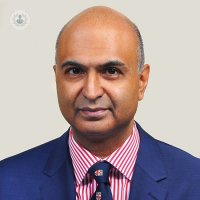Heart failure: causes, symptoms and diagnosis
Written by:Heart failure is a very common and serious heart condition that occurs as a result of the human heart eventually becoming too weak to have the capacity to effectively and regularly pump enough blood throughout the body.
In our latest article, vastly experienced general adult cardiologist, Dr Vinay Kumar Bhatia, provides us with an expert overview of heart failure, what causes it, how it is diagnosed, as well as the major signs and symptoms to watch out for.

What is heart failure?
Heart failure is the medical term commonly used to refer to the general inability or struggling of the heart to pump blood around the human body sufficiently. On average, there are roughly 68,000 new cases reported of heart failure in the UK each year. The condition is more prevalent and is more common amongst the elderly.
What causes heart failure?
There are a variety of reasons why people suffer from heart failure. The commonest causes include the following:
- high blood pressure (hypertension)
- underlying coronary artery disease
- abnormal heart rhythm
- heart valve disease
What are the main signs and symptoms of heart failure?
The most regularly reported symptoms of heart failure include:
- breathlessness
- swelling of the ankles and/or legs
- generalised tiredness
- reduced energy levels
- chest discomfort
- palpitations
How is heart failure diagnosed?
There are numerous amounts of tests that may demonstrate suggestive heart-related abnormalities, such as blood tests, a chest X Ray, as well as an electrocardiogram. The overall diagnostic investigation, however, is almost always carried out through a detailed cardiac ultrasound. The general term used to refer to this is an echocardiogram.
In some cases, in order to carry out effective diagnosis, a handful of patients may also be required to undergo more invasive cardiac investigations, such as coronary angiography.

What treatment options are available?
Patients who suffer from heart disease can be rest assured that there exists a substantial amount of effective treatment options. The most effective heart failure treatment options include the following:
- special pump assist devices
- drugs, such as beta-blockers, ACE-inhibitors and ARBs
- special pacemakers
- heart transplant
- stem cell therapy
It is also important to highlight here that some patients might also be suffering from various other treatable conditions that may be causing heart failure, such as atrial fibrillation and/or aortic stenosis. Some patients will also show significant improvement once they have undergone surgery, focused on improving the blood supply to the heart (coronary artery bypass surgery).
Dr Bhatia is a highly trained, expert adult cardiologist who specialises in conditions relating to the heart. If you are concerned about the health of your health and think you may be suffering from a heart-related abnormality, you can book a consultation with Dr Bhatia by visiting his Top Doctor’s profile here.


